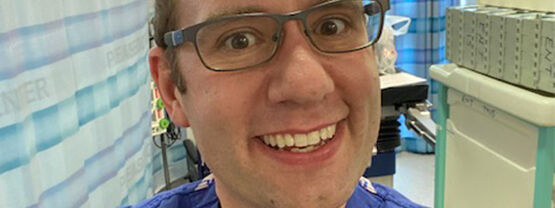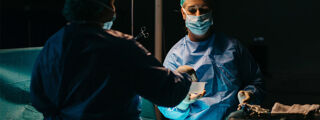As it’s National Operating Department Practice Day, we asked Richard Warren, a BSc (Hons) Operating Department Practice student, why he chose this often overlooked profession, and how he’s finding the course so far.
Why Operating Department Practice (ODP)?
A dream of mine was to work in theatres in hospital, providing holistic care to patients and acting as their advocate while they were unconscious. Having a passion for looking after, caring for and supporting patients, I was looking to study nursing and wanted to become a theatre nurse. Then I came across the role of the ODP and it matched exactly what I was looking for in a career with the NHS, working across Anaesthetics, Surgery and Recovery. It also offered the opportunity for individual progression in these areas or other areas of the hospital requiring ODP skills.
The role offers variety and the ability to specialise. It really appealed to me to be an autonomous practitioner and have the ability to work as part of a multi-disciplinary team focused on patient safety and best possible outcome.
What is it like being a Student Operating Department Practitioner?
Through my first year of study and student placements, I have had lots of opportunities to practice. The University has enabled me to learn with academic teaching and very supportive lecturers and resources including skills labs (mock operating theatre), the library, computers and online platforms for lectures and teaching, as well as Moodle (the online platform for university communication, resources and assessment submission).
BCU teaching is aligned with best practice, national guidelines and takes into account local hospital trusts’ policies. This provides me with understanding and practice experience, learning skills which are required on placement in hospital.
This year has been challenging; I had to work on both my practical and academic skills to become a competent ODP student. If you have a passion for the theatre environment, patients and becoming a professional, then the ODP role is ideal. It is not fully understood by most people but is a key role with in the patient’s perioperative journey. I am very happy to have embarked on this career. My transition back to University life has been smooth and I am proud to be both an ODP and BCU student and can say with all honesty that this is the NHS role for me.
 What would you advise to others considering a career in ODP?
What would you advise to others considering a career in ODP?
If you are a dedicated, reliable and caring person, I would really urge you to research the role of an ODP. This will enable you to understand what skills and qualities that make a good ODP. I would say to anyone who is thinking of becoming an ODP that the course is interesting, varied and yet hugely rewarding. You learn the complete patient journey through the perioperative environment. I truly enjoy working and supporting people on a day to day basis and I know that becoming an ODP will give me the opportunity to make a difference.







